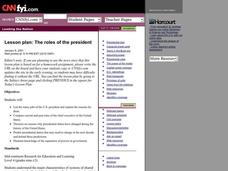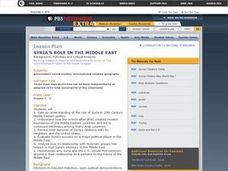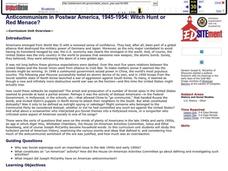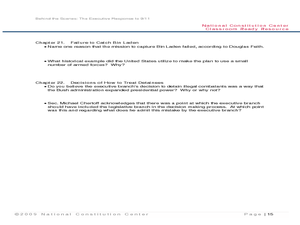Curated OER
Democratic Process, Constitutional Issues, Local Government
Twelfth graders engage in the decision making process so as to encourage them to become active citizens upon graduation from high school.
Minnesota Center for Community Legal Education
Minnesota v. Hershberger
Freedom of religion has been a controversial, yet fundamental, tenet of the United States since even before the nation's birth. In a well-constructed lesson, the class compares the Minnesota Constitution to the US Constitution as a means...
James Madison Memorial Fellowship Foundation
A Picture is Worth a Thousand Words
This exercise on the Constitution requires small groups to design a visual metaphor that expresses the concept behind one of seven principles: popular sovereignty, federalism, republicanism, separation of powers, checks and balances,...
Curated OER
Living News: Classroom Materials
Young scholars explore controversial current events. In this Bill of Rights lesson, students research selected issues and examine the issues from different perspectives. Young scholars script and record news stories that feature their...
Curated OER
A House Dividing: The Growing Crisis of Sectionalism in Antebellum America
Students explore the debates over American slavery and the power of the American federal government for the first half of the 19th century and how the regional economies and political events produced a widening split between the states.
National Endowment for the Humanities
Lesson 2: The Debate in Congress on the Sedition Act
Pupils research and discuss the provisions in the Constitution that supported the arguments for and against the Sedition Act. They articulate objections to and arguments in favor of the Sedition Act.
Curated OER
Raids and Arrests of Enemy Aliens
Student read background summary information and debate how much control did the government require to keep the nation safe. They research how World War II restrictions on enemy lines were enforced and how it related to the U.S....
Curated OER
Telegram from Senator Joseph McCarthy to President Harry S. Truman
Students research Senator Joseph McCarthy's February 9, 1950 speech, given at Wheeling, West Virginia, in which he claimed more than 200 State Department employees were members of the Communist Party.
Curated OER
Civil Liberties and National Security
Students identify the civil liberties outlined in the U.S. Bill of Rights and discuss the importance of these liberties in today's society. They research examples of when Congress has taken legislative action to protect national security.
Curated OER
Defining Citizenship in Recent Events
Students research the rights and responsibilities of citizens and non-citizens living in the U.S. They present a dialogue that showcases their research and take a quiz on the material.
Curated OER
The Roles of the President
High schoolers list the many jobs of the U.S. president and explain the reasons for them. They compare current and past roles of the chief executive of the United States.
Curated OER
Uniform Blues
Fourth graders explore what the U.S. Constitution is and why it is important, the purpose of the state constitution, and its relationship to the U.S. Constitution and the similarities and differences among federal, state and local...
Curated OER
Due Process
Students understand the legal term "due process of law" and its historical origins. They discuss the requirements for "due process of law" in both the U. S. Constitution and the Indiana Constitution and how those rights are similar or...
Curated OER
War Making: Executive and Legislative Powers
Students examine executive and legislative powers. In this federal powers lesson, students determine who has the power to wage war in the U.S. government. Students analyze the Constitution and research historical precedents regarding...
Curated OER
POWERS OF THE PRESIDENT: THE CASE OF LATVIA
Students compare the powers of a U.S. president to those of leaders of other countries. They pretend they are presidential advisors and make decisions as a group as to what the president has the right do in different situations.
Curated OER
Bill of Rights
US history classes explore constitutional rights as they relate to court cases involving teens. Your class must already be familiar with the Bill of Rights before beginning this series of exercises. In preparation for a debate-style...
Curated OER
Who are American Citizens?
Students investigate American citizenship. In this civics lesson plan, students consider the basic knowledge of U. S. government new citizens are required to have. Students also examine the 14th amendment that describes U. S. citizenship.
Curated OER
The Articles of Confederation
The purpose of this lesson is to assist students in discovering the weaknesses of the Articles of Confederation and the foundation for creation of the United States Constitution. Students will investigate the events leading up to the...
Curated OER
Syria's Role in the Middle East
High schoolers hypothesize why Syria and the U.S. should find common ground in their relationship as it pertains to the future of the Middle East.
Curated OER
Witch Hunt or Red Menace? Anticommunism in Postwar America, 1945-1954
Students investigate what constitutes an "un-American" activity and why Soviet espionage was such an important issue in the 1940's and 1950's. Joseph McCarthy's impact on American anticommunism is examined in this lesson. There are three...
State Bar of Texas
Marbury v. Madison
Who has the final say in matters dealing with the rules under the United States Constitution? The case Marbury v. Madison brings to light the issue of judicial review. Learners investigate the Supreme Court's opinion in the case with a...
Curated OER
Imposing Democracy
Twelfth graders discuss the probability of imposing a democracy in a country in which there is no history of this type of government being successful. Using the internet, they work together to research Japan's experience with democracy...
Curated OER
The Constitution
Eighth graders conduct research about the weaknesses of the Articles of Confederation, the Virginia Plan, the New Jersey Plan, the Connecticut (Great) Compromise, and the 3/5 Compromise.
Curated OER
Behind the Scenes: The Executive Response to 9/11
Students examine the actions of the executive branch following the September 11th terrorist attacks. In this U.S. government lesson, students watch segments of a video titled "Behind the Scenes: The Executive Response to 9/11." Students...

























